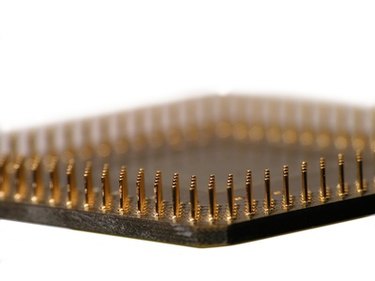
A processor controls virtually every function in a computer. Intel and Advanced Micro Devices (AMD) are the primary manufacturers of processors. They make processors for desktop computers, laptops, notebooks and mobile devices. Different types of processors perform different functions at different speeds, depending on what kind of system they run in. Each type of processor has different functionality, but similarities exist do between among various types.
Types
Video of the Day
Both Intel and AMD make processors for a variety of systems. Intel makes the Core, Pentium and Celeron families of processors for desktop computers, matched by the Phenom, Athlon and Sempron processors from AMD. Intel has its own Core mobile and Celeron processors for laptops, and AMD has Radeon series for notebooks. Some, such as the Intel Core 2 and Athlon X2 use multicore processors, which make use of two or more cores to allow multiprocessing for faster performance. Each processor made by Intel or AMD has specific functions and caters to specific systems, such as desktop computers or workstations at an office. Each processor fits a specific computer, whether pre-assembled, built from scratch or an upgrade.
Video of the Day
Socket
The design of the socket, which houses the processor on the motherboard, changes almost as frequently as the processor itself. AMD typically makes sockets last longer than Intel. AMD's latest processor socket, Socket AM3, functions with types of processors from the previous line, Socket AM2+. When a user wants to change his Intel processor's socket, he most likely will also have to change his processor and maybe even his motherboard as well. When Intel releases a new line of processors, the socket type released with them cannot use processors from a different line. For example, when Intel released Socket LGA1366, it could not function with processors released for Socket LGA775. This also makes upgrading an Intel-based system more expensive than upgrading an AMD-based system.
Clock Speed
The clock speed measures how fast a processor completes operations, usually measured in megahertz and gigahertz. A 1.8GHz processor runs at 1,800,000,000 cycles per second. Intel and AMD processors use different internal designs, so comparing, for example, a 1.8GHz AMD processor to a 2.4GHz AMD processor tells you that the 2.4GHz runs faster; comparing a pair of 1.8GHz processors made by AMD and Intel does not accurately determine which runs faster. In order to do work, the processor will break a task down into multiple stages. Typically, Intel processors perform more stages and therefore do more work and take longer than AMD processors to complete tasks.